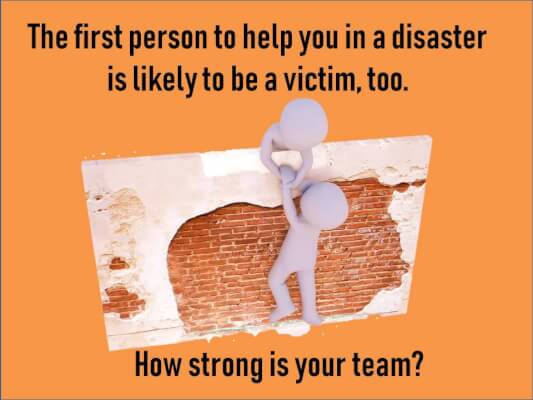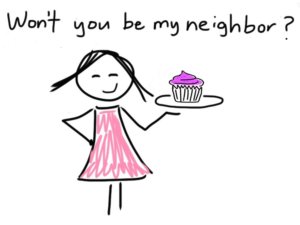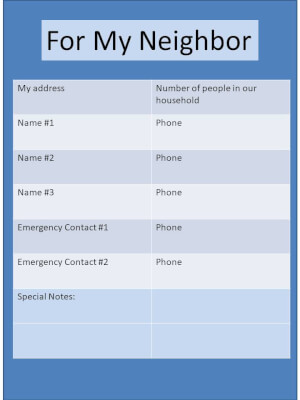
Start a new year, strengthen your team.
The first rescuers in a disaster are others who are right there. Your neighbors. Your co-workers. They know you. They know where you are likely to be, and whether they should search for you!
Improve your chances of survival by building a stronger team around you – in your neighborhood and at work.
If you’ve got the start of a team . . .
Last year (2018 was so long ago!) we focused on creating what we think are some helpful blueprints for building that team. To make them more useful, we customized by type of neighborhood you might find yourself in.
Each of the books in our Neighborhood Disaster Survival Series addresses a different type of neighborhood:
- An apartment or condominium neighborhood, where neighbors come and go, storage space may be limited, and since you don’t own the entire building, some preparedness options are limited. Improve your chances of survival by sharing and working together.
- A mobilehome community, where building standards vary so homes may be more vulnerable to certain natural disasters and top infrastructure threats include broken gas and water lines.
- A suburban neighborhood where options may be more varied but homes are so far apart you may not even know your neighbors or where families may have a “My home is my fortress.” attitude.
- A small business whose owner is typically torn between meeting current profitability necessities and providing for what feel like only potential business or employee losses.
Steady wins the race.
You can’t build a team quickly. The guides go into great detail about building teams. They focus on identifying leaders to start the process, and suggest that the leaders get Community Emergency Response Team training so they share some of the same skills and approach emergencies in a systematic way.
Once this core group is ready to go, its members can begin to pull in other neighbors. The guides have plenty of ideas for ways to attract neighbors and get them involved. Your team will find it easy to arrive at emergency preparedness recommendations for the whole neighborhood. They may even come up with a written plan. All this will improve your chances of survival.
Many, many neighborhoods around the country have followed a similar road to improving their resilience.
But what if you don’t have a team?
What are you doing or planning, at home or at work, to improve your chances of survival?
- If you have trained CERT graduates in your neighborhood, maybe they have stepped up to take on a leadership role. Or maybe you could encourage them to do so?
- If you have a property manager or business owner who is tuned in to emergency preparedness, has that person taken some steps for more resilience? Maybe you could suggest and support those efforts? (Lots of ideas here at Emergency Plan Guide!)
- What if nothing is happening in your neighborhood, and you feel like a voice in the wilderness?
Here in our community our team has shrunk. So we’ve decided that it’s time for a renewed neighborhood effort. We’re starting – again – from scratch!
Set the tone.
 Remember this cartoon from the Advisory a couple of weeks ago? We’re using it to set the tone for our 2019 team-building effort. Friendly, not threatening or guilt-inducing.
Remember this cartoon from the Advisory a couple of weeks ago? We’re using it to set the tone for our 2019 team-building effort. Friendly, not threatening or guilt-inducing.
Simple first step.
This week, we’re following up with the next step, providing neighbors with a simple form that they can fill out and share. The form is a simplified List of Emergency Contacts aimed at bringing neighbors together who may never really have met.
 Here are instructions we’re sending along with the form:
Here are instructions we’re sending along with the form:
Fill it out this form WITH YOUR INFORMATION. Maybe your emergency contact is your daughter. Mention that. And under “Special notes” you could add your pet.
Make a few copies of this information about you, and make a few blank copies too. (You don’t need a form; a simple piece of paper will do.)
Then, step next door and introduce yourself and share this information. Ask neighbors to share their info in return. Exchanging info doesn’t mean you’re promising to be best friends. What you are doing, though, is making our neighborhood a friendlier place, and making it safer and more secure, too.
A good way to start the year, don’t you agree?
Neighborhoods change, and neighbors change. Here in our own household we’ve noticed one thing that happened in 2018 – we’re getting older!
But no matter the exact circumstances, having good neighbors, and being a good neighbor, will improve your chances of surviving a disaster. We are all in this together!
Virginia
Your Emergency Plan Guide team
P.S. How well do you know your neighbors? Have you exchanged important contact info? Let us know how you went about it! We need all the suggestions we can get, because this seems to be one of the biggest challenges to starting a neighborhood group!
Don't miss a single Advisory.
Thank you for subscribing.
Something went wrong.
